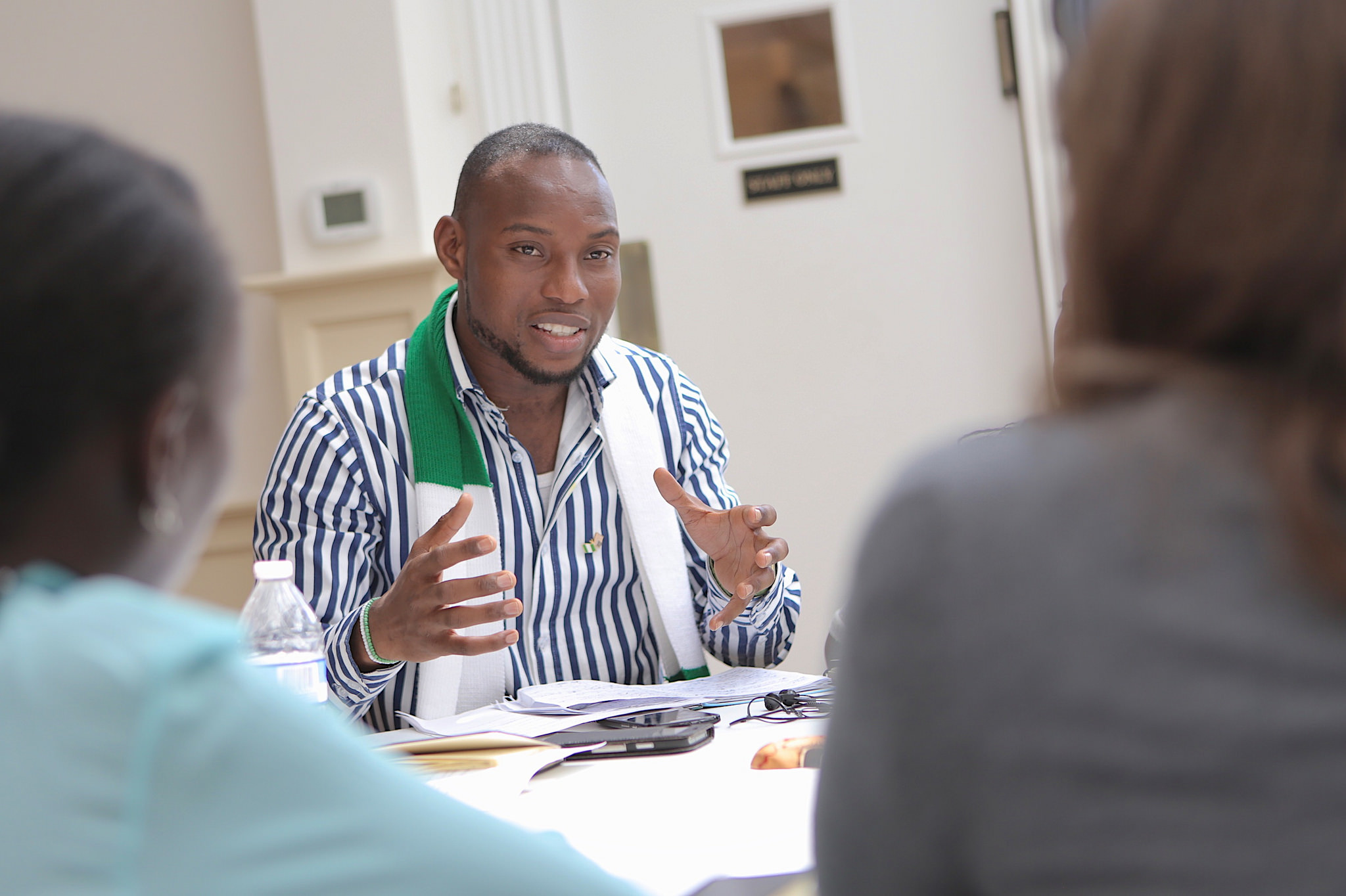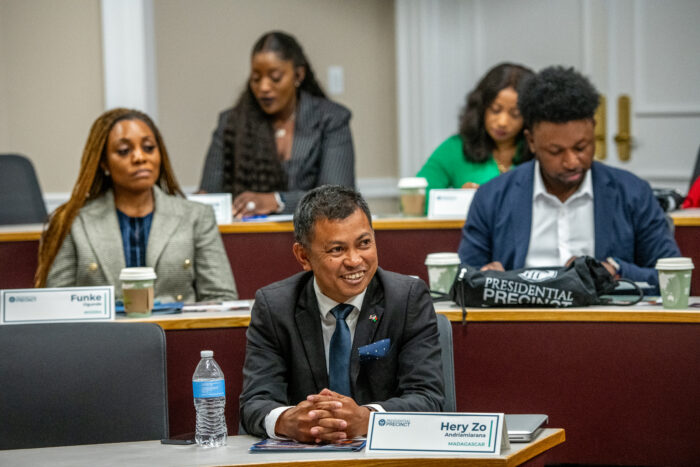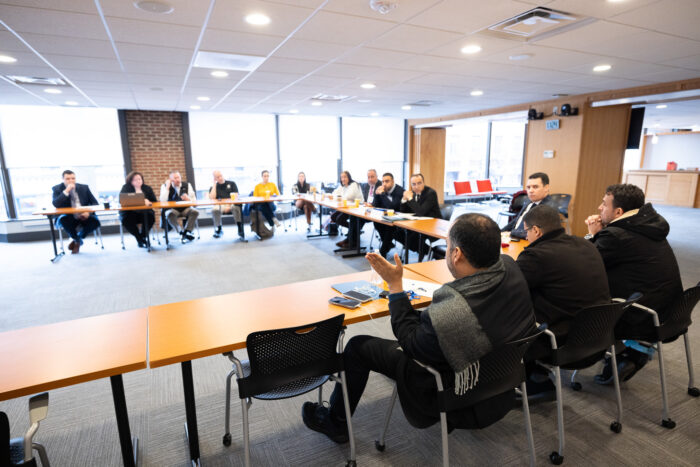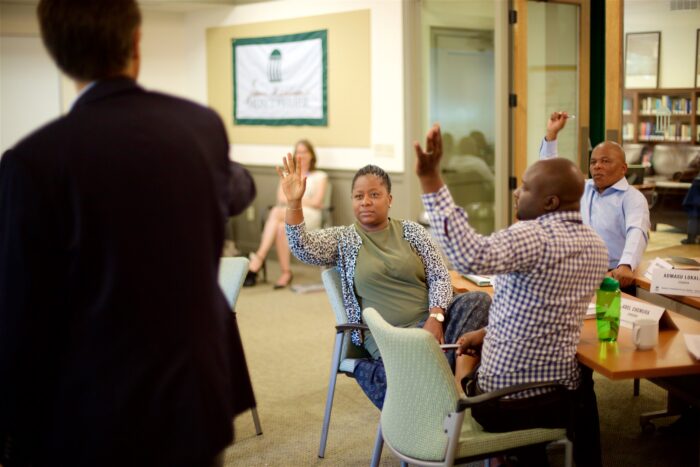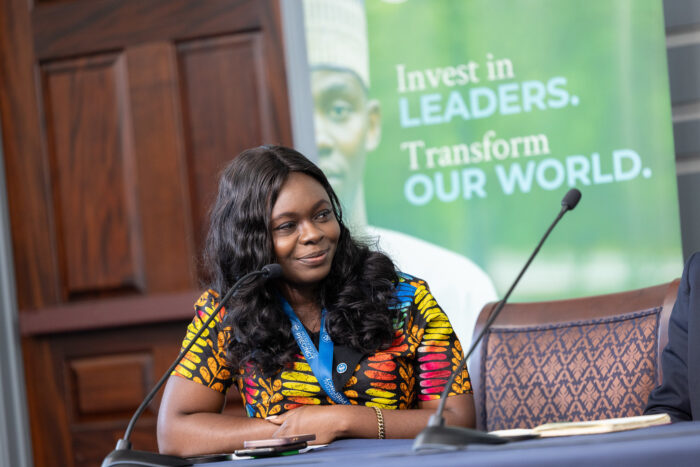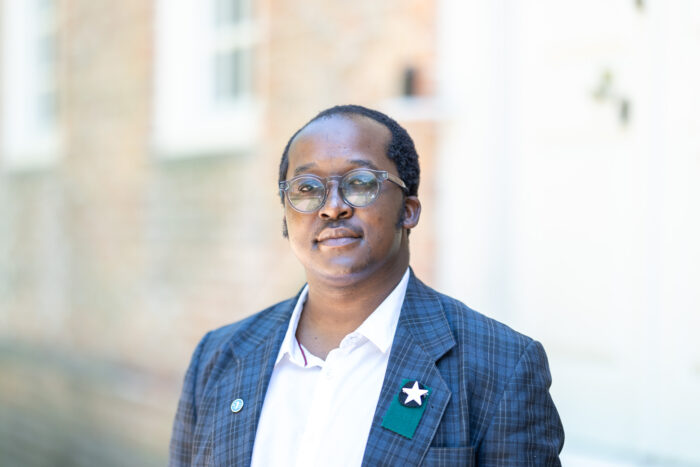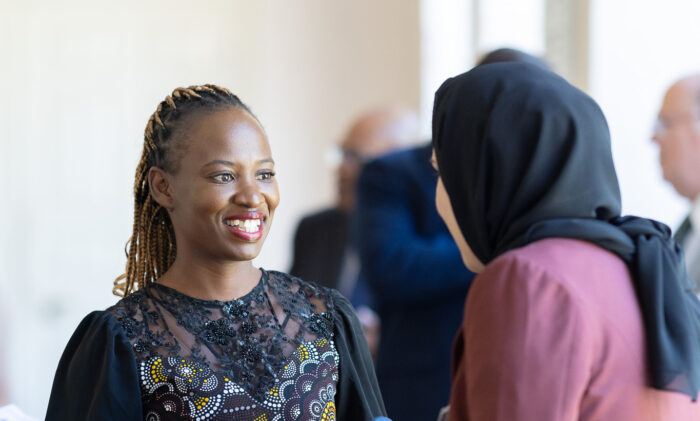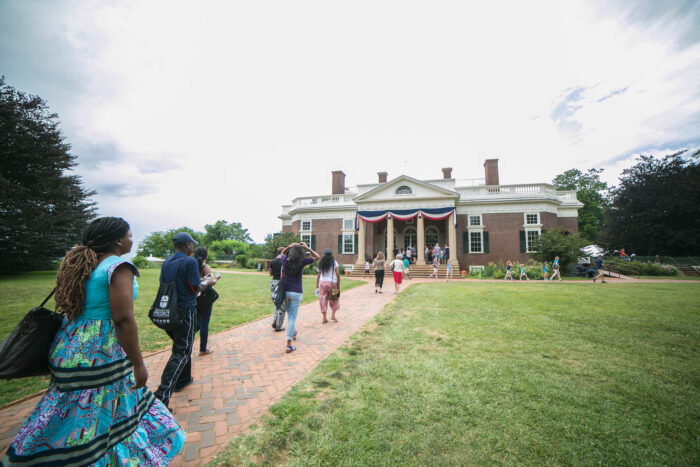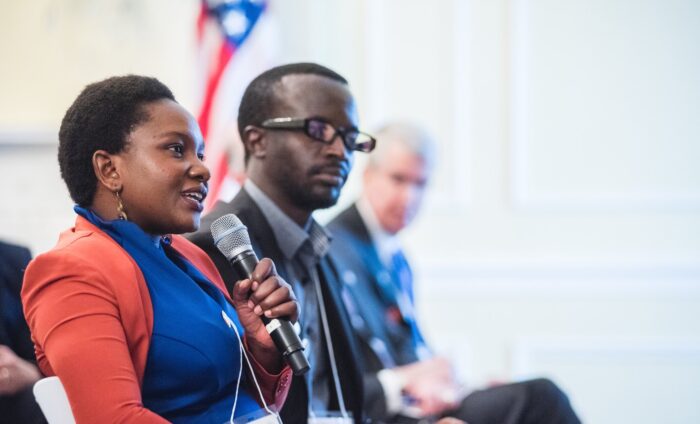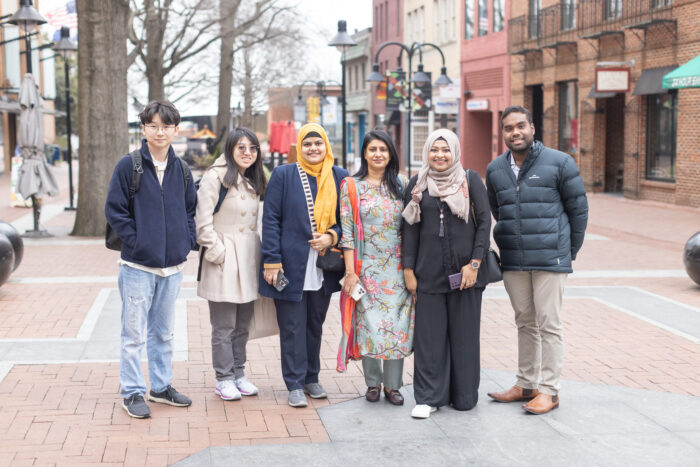Co-founder of Nigerian Youths in Motion Propels Education Reform
“I need to be the kind of person that creates opportunities,” Oluwatimilehir “Timi” Olagunju from Nigeria tells the State Department’s Macon Phillips in a podcast.
Through his non-profit organization Nigerian Youths in Motion (NYM), Timi helps empower over 350 young Nigerians in engaging their community, government and institutions to help create better opportunities for themselves and their peers.
NYM “was born out of a need to harness the intellectual energies and creativity of young people. So it was channeling it towards making policy recommendations to the government,” he said.
So far the organization has been able to increase Nigeria’s education budget by 350 percent since 2012.
What’s next for this hardworking lawyer, writer and speaker? Listen to the full podcast to find out!
~ Podcast Transcript ~
MACON PHILLIPS: Welcome young African leaders. This is the YALI Voices podcast. A place to share some of the best stories from the Young African Leaders Initiative network. My name is Macon Phillips. Thank you for joining us today. Don’t forget to subscribe to this podcast by visiting yali.state.gov to stay up-to-date on everything YALI. And if you like what you hear, we’d love it if you’d recommend us to your friends.
I recently had the chance to sit down with Timi Olagunju. Timi is a really interesting guy from Nigeria. He’s a lawyer. He’s an author. He’s a speaker. And he’s really passionate about good governance. Someday, he might even be president of Nigeria.
At age 10, Timi’s father left, his mother lost her job, and he was forced to finish his primary education in a barely functioning public school. From that point on, Timi has dedicated his life to fighting for good governance, human rights, democracy, and you. He credits his work ethic and values, not surprisingly, to his mom. And that’s where we’ll pick up the interview.
Let’s start. Tell me about your mom, Timi.
TIMI OLAGUNJU: OK. My mum was a fantastic woman. I grew up with my mum and she gave me the opportunity to become the man that I am and will be through dedication towards investment in education, and an emphasis on values, and the need to serve the people, service, basically. So those core values were quite fundamental and I learned them through my mum.
MACON PHILLIPS: Look, we’ve all been kids.
TIMI OLAGUNJU: Yeah.
MACON PHILLIPS: Sometimes having your parents say you need to get out there and do public service isn’t exactly what you want to hear. You know what I mean? So how was your mom able to get you in the right direction? What was her style like? Was she kind of stern and drawing the lines or was she real friendly?
TIMI OLAGUNJU: She was real friendly.
MACON PHILLIPS: OK.
TIMI OLAGUNJU: She was not particularly empathetic as to– what’s it called– how it should go. But there’s this thing about I learned from her which is the fact that when you create the right environment for child, you see the child explore the context of that environment to develop personal creativity, develop personal values. And that’s something she does.
She insures that I get busy with the right things. She enrolls me in the right association. Gets me involved with her. I come back from school she says, where’s your homework? So basically, it’s about the environment.
Even my influence towards studying law was not– she said, what did you want to study? And I looked. I said engineering. I’m good at math. OK Accounting. I’m good at economics. And law? Hmm, well it’s good, Timi. So it was more like that.
MACON PHILLIPS: So did you come out of that house on a straight line knowing exactly what you wanted to do and no interference.
[LAUGHING]
No problems. You know, just a cake walk all the way through?
TIMI OLAGUNJU: Not at all. Not at all.
MACON PHILLIPS: What happened? Where did it all go wrong?
TIMI OLAGUNJU: OK. Well, basically, the truth about it is they say he has to go around [INAUDIBLE] sometimes. Sometimes you take the non out of the nonsense. You find sense. So the nonsense, where the non came into the sense, was from really during my teenage years when I didn’t particularly know what I wanted to do.
I was so good at [INAUDIBLE] and mathematics. I perhaps was so good that I thought engineering was my way and, at that time, my math teacher loved me. So I felt that, well, this is it. And then, consequently, I lead to decide, OK, no, accounting. I think I should be an accountant. And then later on, law.
But during that time, before then, there was a time that– because I started my primary school, it was one of the best schools in Nigeria– I was taught by Kenyans. To be frank, Kenyans actually have some of the best teachers too. So we had Kenyan teaches. I had Irish teachers. I had teachers from the UK teaching.
But at the time, my dad traveled and then I didn’t have the opportunity to see him anymore. And then my mom had to take up the responsibility of catering for a young man who was– and then, at that time, several things happened and then everything collapsed.
So I had to move from a private school that was high class, high brow, with the high things. I came to a really public school, secondary high school. That’s a secondary school. And, in that secondary school, you have to find chairs. Sometimes we had to struggle to get chairs. So the big guys like you, you, and the small guys like us, would have to tussle chairs out.
And then you find that teachers never came to class. So they were more particular about coming to class when the investigators were around. So that gave me an understanding, the look. I was coming from this world. Now I’m in this particular world.
The difference here is the fact that it is not as if the people in this other world do not have capacities, but they don’t have opportunities. So that stuck in my mind. I need to be the kind of person that creates opportunities. And then that drove, in my mind, I need to be that kind of person.
Because the kind of person that can drive policies, that provide equal opportunities for the young and security for the old. Because when you create security for the old, the young they are more interested, excited about working hard in the future. So that actually drove my line towards law, governments, policy.
MACON PHILLIPS: Right. So walk us through that. So you’re in secondary school. You get, kind of, a splash of water in the face. Like, this is the way the world works and–
TIMI OLAGUNJU: You need to be calm.
MACON PHILLIPS: Realizing– yeah, we have to stay calm. That’s right. We’ve all had those moments. And so you decide then that you really want to pursue a career that creates opportunities for other people. So just walk us quickly through where you went from there and how you found yourself in a law school classroom.
TIMI OLAGUNJU: Exactly. So consequently, in my secondary school, it was the senior years, somehow I stumbled into a Press Club. And in the Press Club we would write articles. Articles about teachers were strategic and systematic. How can you fight the same people that you– on that same roof and we’d write the articles and paste them in the schools. So it was trouble.
So from there I moved into becoming the acting editor in chief for the Press Club. And there I really came to start concretizing my ideals in terms of the capacity to actually vocalize, accentuate your ideas in such a way that it influences people. So I started through words. And then from there, law.
So I studied law at the university . And so, at the university, I already had an idea of the fact that, look, I was more tilted towards leadership and governance. And so, at the university, I just decided to look. After the first year. After having a good foundation. A good grade. Because even the ladies know that, if the foundation be destroyed, what can [INAUDIBLE] do? You know. And that’s the truth.
So I wanted to create a good foundation because I understand the importance of foundation in primary school. That helped me even when I was not in the same level at the primary school. And then at 200 level, I started getting into leadership. I was very involved in leadership until I literally became the chairman of the largest undergraduate hostel in the university.
And, at then, there was no student union. So ultimately because of that rule, I became the interim student union president for a whole year. And then that really gave me another platform to [INAUDIBLE] beyond just writing and words because I came to [INAUDIBLE] through words.
People like the way I talk and when I write. So they, hey, who’s this Timi guy? And then leadership opportunity came and then I started developing my capacity to lead. And after going through law school and all that, I focused more around law, governance, and leadership and everything that I do, at this moment, around that. Everything.
MACON PHILLIPS: So now how long ago was that? When did you finish law school?
TIMI OLAGUNJU: 2009.
MACON PHILLIPS: So 2009. So what have the last seven years been for you in terms of focusing on governance? I’m sure you’ve kept learning. I’m sure you kept succeeding and failing and then trying to chart a course through all this. So take us through the last seven years. What have you been working on?
TIMI OLAGUNJU: Yes. Well, fantastic. When people hear seven years, they look at my face and they say, OK, he’s not that old.
[LAUGHING]
Well, I just became 30 years a few weeks ago.
MACON PHILLIPS: That’s not that old. Don’t worry. Don’t worry. You don’t have any gray hairs yet. So don’t worry about that.
TIMI OLAGUNJU: So basically I had to clarify that. The truth about it is through that time I first went through tutelage. I worked with some seniors and all that, in the law practice, and so that I can get an understanding of what it was like. And then, two years doing that, I knew that I just had to do something different.
So we started up the Nigerian Youths in Motion. The Nigerian Youths in Motion was born out of a need to harness the intellectual energies and creativity of young people. So it was channelling it towards making policy recommendations to the government. And so we started that up. I became a co-founder and throughout that we’ve, through the Nigerian Youths in Motion, we’ve made a lot of successes, in education for instance.
In 2012 budgets, we were able to increase the budget for education from around $110 million naira to over 350% and it’s not being done in the last 15 years.
MACON PHILLIPS: Well, that will buy some more chairs, right?
TIMI OLAGUNJU: Yes.
MACON PHILLIPS: You know what I mean?
TIMI OLAGUNJU: Exactly.
MACON PHILLIPS: That’s great.
TIMI OLAGUNJU: And we did that–
MACON PHILLIPS: How did you do that?
TIMI OLAGUNJU: Exactly.
MACON PHILLIPS: One of the things I hear from people when I talk to them, and this is in the states, but certainly when I talk to people in YALI, it’s easy to describe the problem, but the government and changes in policy can seem so far away. How did you even start? Where’s the first step?
TIMI OLAGUNJU: That’s the key point. That is a fundamentally key point. And that’s what we need to learn because evidence is the end of argument. Most times you don’t look around us enough to see those who are doing something around what we seem to want to solve and then learn from there.
The strategy’s just simple. We went. We declared a policy statement stating the facts. And that’s why you need to get your facts right with the right team of people. You need a body. All the civil rights movements in the US, all the movements in the world that succeed, do not will succeed on the shoulders of individuals. There’s not like [INAUDIBLE].
You need to create a structure. And so we came up with a structure, the Nigerian Youths in Motion. The structure started gaining momentum. That’s people that buy into the same ideals. That’s people. The people start to recommend policy. Policy connected with people recommend policy.
But we didn’t stop at that. We had to be strategic. So being a lawyer, I used my legal skills in courts. Most all the issues were won out of the courts, mobilizing young people. So for that particular issue, we had what we call, push. Protest until something happens. And we’re focused and our focus was education.
Where is cut everywhere? Where in education, in finance, in procurement? No Tom, Dick, and Harry. We’re just Tom. I let Dick and Harry alone. So education. We focused on that. We zoomed down. Put all our strategies to it. Interestingly, with media, press publicity, and at all. And that’s the same strategy.
MACON PHILLIPS: Same focus.
TIMI OLAGUNJU: Yes. So that’s one thing young people need to understand. It’s not an individual thing. It’s not about competition. It’s about complementation.
MACON PHILLIPS: Now, in terms of the specific focus, education was the topic, but your example success was pretty specific. You were able to say this budget was increased by x percentage so–
TIMI OLAGUNJU: Yes.
MACON PHILLIPS: In terms of your message, what you were saying to the government, what you were saying to the media, what you were saying to other people that wanted to join the group, were you moving beyond simply, education’s important, we need to do something about it, to a more specific ask.
TIMI OLAGUNJU: The strategy to get people inclined with the ideal was simple. Not everybody was focused on education. That’s the truth. Some people were more focused on cost of health. Some people were more focused about graduating and getting a job. Employment.
But, somehow, the think tank were able to come up with a strategy that outlines all the different needs around the central theme of education. And so, if your issue is health, we’ll make you realize the connection between health and education. So our campaign was around that. And the social media was very powerful. But outside the social media were also these hand deals.
MACON PHILLIPS: Combine the online and the offline.
TIMI OLAGUNJU: Yes. To galvanize people.
MACON PHILLIPS: That’s an amazing victory and I assume that organization’s continuing?
TIMI OLAGUNJU: Yes. That’s one of the many.
MACON PHILLIPS: Youths are still in motion?
TIMI OLAGUNJU: Yes. Yes. Still in motion. In fact, we’ve even moved beyond Youths in Motion. We’ve moved to the Good Governance Hub which started last year after the elections.
MACON PHILLIPS: In Nigeria?
TIMI OLAGUNJU: Yes. Now the Good Governance Hub came up on off-shoot of Nigerian Youths in Motion. But then Good Governance Hub came up after the election. We did a survey in the Nigerian Youths in Motion. We looked at whether the electoral capacity, being the fact that young people voted massively, translated to power for young people. Nigeria is a country, 18 to 35, 65% of the population. Young people. Massively young people.
Now the truth about it is this. That should be reflected in political participation. And, if it is not, then there’s a problem. The democracy, with inclusiveness. And so we did a research. Federal parliamentarians, how many federal parliamentarians are between the ages of 30 and 35? Shocker. Just one. And that one parliamentarian, this year, he’s 36. Already he’s crossed over. Simply we don’t have a youth now.
We now went forward. We said, look, let’s be a little bit generous. OK? Let’s go 36 to 40. Can we get someone within that age? We got only nine people. And then we looked at lead women. OK, women between the ages of 30 and 40, because 30 is the age you can vote. And that’s one of things we are fighting. That, if you can pay your taxes at 18, and you can join the army and die for your country at 18, it is logical, sensible, and correct that you can also be voted for at 18. So that’s a push.
But then, 30 to 40 for females, we didn’t find any. So that spotted something. Now, look, we need to increase political participation. So Good Governance Hub.
MACON PHILLIPS: Right. And so that’s–
TIMI OLAGUNJU: Was [INAUDIBLE] last year. We’ve had three events with successes also. With a different strategy from the Nigerian Youths in Motion. You know, Nigerian Youths in Motion is more on focusing. But the Good Governance Hub is now becoming a Hub. And, in the next 10 years, in the next 15 years, our goal is to make the Good Governance Hub become an innovation center that will not just only increase youth participation directly, but to engage young people to solve community problems around governance and democracy.
MACON PHILLIPS: And are you looking really just within Nigeria? Or are you looking regionally?
TIMI OLAGUNJU: Nigeria. For the next 10 years. And then the success in Nigeria will be a pilot for a sort of franchise for other success stories to spring forward from there.
MACON PHILLIPS: Well, I’m sure as you know, throughout YALI and even beyond YALI, there’s a ton of Timi’s in other countries that are focused on good governance and some sort of [INAUDIBLE] network model. So my guess is that you’re going to be, if you already aren’t already, lashed up with other people sharing those best practices. And you strike me as someone who may never sleep. I don’t know.
[LAUGHING]
A lot of energy. So would you say you’re someone who is an early morning riser or are you a late night owl?
TIMI OLAGUNJU: Well, I do a lot of the stuff in the night and also in the morning.
MACON PHILLIPS: Exactly. So you never sleep.
TIMI OLAGUNJU: Well, in the afternoon, I take some great key nap. Because I know I’m most active in the morning and in the night. So I do a lot of thinking in the morning because you can’t give what you don’t have. In my book, The Hustler’s Mentality, I wrote about the peak time, the peak place. Your peak time defers. For me, my peak time is morning and also night, so I try to maximize that. Then in the afternoon, I could have fun and just relax.
MACON PHILLIPS: OK. All right. I like that. That’s good. Well, we are hearing from the future president of Nigeria here. You heard it here first.
TIMI OLAGUNJU: Yes. Yes.
MACON PHILLIPS: We got the early interview.
TIMI OLAGUNJU: Yes.
[LAUGHING]
MACON PHILLIPS: We’ll have the follow-up interview in your office, in a few years.
TIMI OLAGUNJU: Yes.
MACON PHILLIPS: And it’s just been a real treat talking to you. I really appreciate it. Thanks for all of your time today. Thank you for being here.
TIMI OLAGUNJU: It’s a pleasure.
MACON PHILLIPS: Well it’s pretty clear that Timi is an energetic, natural leader who’s really making things happen in Nigeria and I want to thank him for spending his time with all of us today. If you’d like to get in touch with him, check him out on Twitter at Timi the law. That’s T-I-M-I-T-H-E-L-A-W, and on Facebook as Timmy Olagunju.
His books, The Hustlers Mentality, Leading From Within, and Yes, Africa Can, are both available online. Don’t forget to check out his organizations as well, Nigerian Youths in Motion and the Good Governance Hub.
Thanks so much for listening and make sure to subscribe so you don’t miss any of the upcoming interviews with other young African leaders. Join the YALI network at yali.state.gov and be part of something bigger. Our theme music is E Go Happen by Grace Jerry, produced by the Presidential Precinct. The YALI voices podcast is brought to you by the US Department of State and is part of the Young African Leaders Initiative, which is funded by the US government.
YALI Voices Podcast managed by the U.S. Department of State

